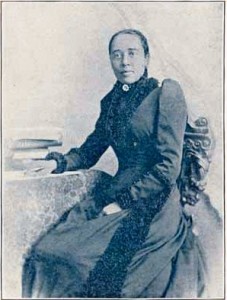
This week’s open threads will highlight black feminists/womanists scholars.
Anna Julia Haywood Cooper (Raleigh, August 10, 1858 – February 27, 1964) was an American author, educator, speaker and one of the most prominent African-American scholars in United States history. Upon receiving her PhD in history from the University of Paris-Sorbonne in 1924, Cooper became the fourth African-American woman to earn a doctoral degree. She was also a prominent member of Washington, D.C.’s African-American community.
Anna “Annie” Julia Cooper was born into enslavement in Raleigh, North Carolina, in 1858 to Hannah Stanley Haywood, an enslaved woman in the home of prominent Wake County landowner George Washington Haywood. Haywood is widely believed by historians to be the biological father of Stanley’s seven daughters. Cooper had two older brothers named Andrew J. Haywood and Rufus Haywood, and worked as a domestic servant in the Haywood home.
In 1868, when Cooper was ten years old, she received a scholarship and began her education at the newly opened Saint Augustine’s Normal School and Collegiate Institute in Raleigh, founded by the local Episcopal Diocese for the purpose of training teachers to educate former slaves and their families. According to Mark S. Giles, a Cooper biographer, “the educational levels offered at St. Augustine ranged from primary to high school, including trade-skill training.” During her fourteen years at St. Augustine’s, she distinguished herself as a bright and ambitious student, who showed equal promise in both liberal arts and analytical disciplines such as math and science; her subjects included languages (Latin, French, Greek), English literature, math and science. Although the school had a special track reserved for women – dubbed the “Ladies’ Course” – and the administration actively discouraged women from pursuing higher-level courses, Cooper fought for her right to take a course reserved for men, by demonstrating her scholastic ability.
In fact, Cooper excelled in her academics to the point where she was able to tutor younger students. During this period, St. Augustine’s pedagogical emphasis was on training young men for the ministry and preparing them for additional training at four-year universities. One of these men, George A. C. Cooper, would later become her husband for two years until his death.
Cooper’s work as a tutor also helped her pay for her educational expenses. After completing her studies, she remained at the institution as an instructor. In an ironic twist, her husband’s early death may well have contributed to her ability to continue teaching; had she stayed married, she might have been encouraged or required to withdraw from the university to become a housewife.
During her years as a teacher and principal at M Street High School, Cooper completed her first book, A Voice from the South: By A Woman from the South, published in 1892. It was her only published work, although she delivered many speeches calling for civil rights and woman’s rights. Perhaps her most well-known volume of writing, A Voice from the South is widely viewed as one of the first articulations of Black feminism. The book advanced a vision of self-determination through education and social uplift for African-American women. Its central thesis was that the educational, moral, and spiritual progress of black women would improve the general standing of the entire African-American community. She says that the violent natures of men often run counter to the goals of higher education, so it is important to foster more female intellectuals because they will bring more elegance to education. This view was criticized by some as submissive to the 19th-century cult of true womanhood, but others label it as one of the most important arguments for black feminism in the 19th century. Cooper advanced the view that it was the duty of educated and successful black women to support their underprivileged peers in achieving their goals. The essays in A Voice from the South also touched on a variety of topics, from racism and the socioeconomic realities of black families to the administration of the Episcopal Church.
Cooper was not only an author and educator, but she was a speaker as well. Some notable speeches were delivered at the World’s Congress of Representative Women in Chicago in 1893 (in which she was one of three black women invited to speak) and the first Pan-African Conference in London in 1900 (when she delivered a paper entitled “The Negro Problem in America”).
In 1914, at the age of 56, Cooper began courses for her doctoral degree at Columbia University, but was forced to interrupt her studies in 1915 when she adopted the five children of her late half-brother upon their mother’s death. Later on she was able to transfer her credits to the University of Paris-Sorbonne, which however did not accept her Columbia thesis, an edition of Le Pèlerinage de Charlemagne. Over the course of a decade she was able to research and compose her dissertation, completing her coursework in 1924. Cooper defended her thesis The Attitude of France on the Question of Slavery Between 1789 and 1848 in 1925. At the age of sixty-five, Cooper became the fourth black woman in American history to earn a Doctorate of Philosophy degree.
Although the alumni magazine of her undergraduate alma mater, Oberlin College, praised her in 1924, saying, “The class of ’84 is honored in the achievement of this scholarly and colored alumna”, when she tried to present her edition of Le Pèlerinage de Charlemagne to the college the next year, it was rejected.
On February 27, 1964, Cooper died in Washington, D.C., at the age of 105. Her memorial was held in a chapel on the campus of Saint Augustine’s College, where her academic career began. She was buried alongside her husband at the City Cemetery in Raleigh.
In 2009, the United States Postal Service released a commemorative stamp in Cooper’s honor.
Cooper is honored with Elizabeth Evelyn Wright with a feast day on the liturgical calendar of the Episcopal Church (USA) on February 28.

